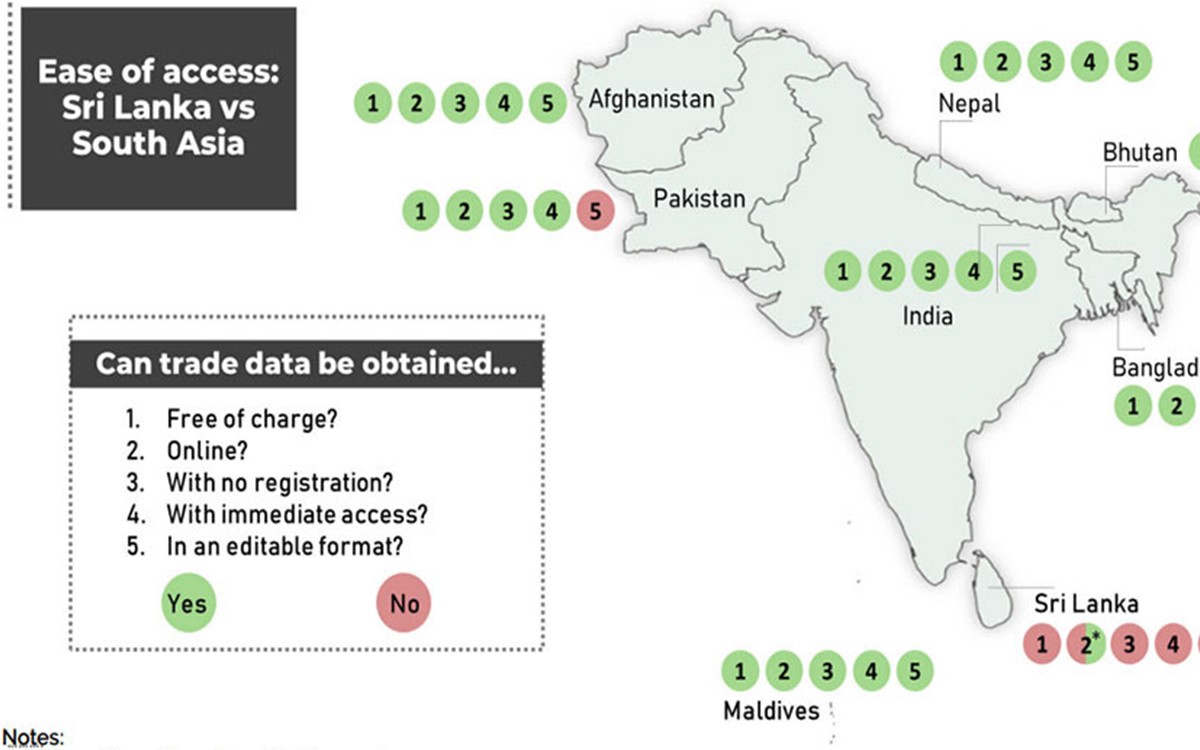Taken from – Ceylon Today
Sri Lanka lags behind its regional peers in terms of ease of access to trade data, mainly because of Sri Lanka Customs (SLC) restrictive data dissemination policy, states a recent research study by Verite Research.
Unlike many other countries which provide free online product-wise disaggregated statistics, SLC doesn’t provide free online trade statistics. SLC charges around Rs 8,000 to Rs 21,000 for different kinds of data.
A broad detailed user-friendly trade statistics is important in many ways like negotiating Multilateral or Bilateral Trade Agreements or with World Trade Organisation, stated Verite Research Director Subhashini Abeysinghe at a seminar to present the findings of the Research study.
“A detailed trade statistics is important to negotiating Free Trade Agreements (FTA) and also follow up on advantages and disadvantages of the FTA, export potential of FTAs and their impact on domestic industry.
Domestic industries complain about imports from FTA’s. To safeguard the domestic industries, Anti- Dumping and Countervailing Duties Act was enacted in 2018, however, there should be availability of product-wise monthly disaggregated statistics to monitor the imports and take necessary action in the case dumping Sri Lanka with imported products.
In addition, promoting trade data to potential investors would help showcase Sri Lanka’s potential for increased foreign direct investment (FDI) in targeted areas.” stated Abeysinghe.
There is lack of clarity as to whether SLC’s selling of trade statistics is permissible under the legal framework set out under the RTI Act. The report states that, as per SLC, a letter issued by the Ministry of Finance, dated 16th November 2004, has granted it permission to split proceeds from the sale of trade data 40:60 between the consolidated fund of the Ministry and the officers involved in the process of trade data collection, respectively.
“This process is a clear example of the privatisation of data, where statistics collected with public funds are being used by public officials to earn money. These circumstances essentially undermine the benefits of data for the public good. Moreover, this behaviour can lead to rent seeking, as in a private monopoly, given that SLC is the primary source for trade statistics in Sri Lanka mandated to collect data on imports and exports” claims the report findings.
Sri Lanka lags behind even the South Asian region in this respect, states Verite Research Assistant Analyst Mathisha Arangala.
“In contrast to Sri Lanka, all other South Asian countries provide free and instant access to trade statistics on online platforms at the most disaggregated level (at HS 8-digit or 10-digit levels). Given the volume of statistics generated in India, it is likely to incur much higher costs than Sri Lanka for data collection. In 2019, India’s good exports were valued at USD 323 Bn and imports at USD 480 Bn, while Sri Lanka’s goods exports and imports were valued at USD 12 Bn and 20 Bn, respectively, in 2019. The data for India must also be collected from 29 states for goods that pass-through around 13 seaports, 34 international airports and cross 7 land borders. In contrast, Sri Lanka has one main seaport, which account for almost 90% of its cargo, and one international airport.” said Arangala.
UN COMTRADE is a platform publishing free online trade statistics of more than 170 countries with various analytical tools. However, Sri Lanka’s trade data in the platform are more than 3 years old. In the yearly trade statistics UN COMTRADE provides, it has updated data for 59 countries till 2019, 80 countries till 2018, and only 19 countries including Sri Lanka till 2017.
With regards to monthly data UN COMTRADE provides, it has updated data till 2020 for 52 countries, 44 countries till 2019, 28 countries till 2018, 12 countries till 2017, 23 countries with Data before 2017. UN COMTRADE monthly trade data for Sri Lanka has been updated only till February 2012, stated the report findings.
